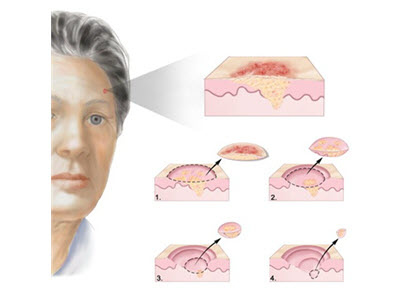Skin cancer
Of all types of cancer, it occurs most often in the Netherlands. There are different forms of skin cancer. The most common form of skin cancer is basal cell carcinoma. Squamous cell carcinoma and melanoma are other known forms of skin cancer.
About 1 in 6 Dutch people will develop some form of skin cancer in their lifetime, usually basal cell carcinoma. This skin cancer originates from cells located at the top of the skin. Sun burns and too much sun exposure are the main causes of their occurrence. Because the cells in the skin are irreparably damaged by sunlight , skin cancer can develop.
In most cases, skin cancer can be treated well with skin cancer surgery. Mohs surgery treatment is often performed for skin cancer on the head in a Mohs surgery clinic.
Basal cell carcinoma
Basal cell carcinoma can express itself in different ways. There are also a number of different types of basal cell carcinoma, of which the nodular and infiltrating type are most common in the face. In addition, the superficial type occurs. The nodular type often manifests itself as a skin-colored to pink shiny bump, which gradually expands. The infiltrating type is often difficult to recognize, changes in the skin can be subtle. It is often flatter and less shiny. It usually starts to show up when crusts form or when the area starts to bleed easily. If skin cancer is suspected, it is wise to go to the doctor.
Mohs surgery
Excising skin cancer is the most effective treatment. The smaller, simpler tumors can be cut out, with a margin of healthy skin and the wound can be stitched immediately. The tissue is later checked in the laboratory to see if all skin cancer has been removed, usually the result is known after 2 weeks.
The larger and more difficult tumors on the face are treated with Mohs surgery in Mohs surgery clinic. This also applies to tumors that are in a difficult place, such as on the nose, around the eyes and on the ears. This does not remove a wide margin of healthy skin around the skin cancer, but it is just tightly removed. This is possible because the entire cutting edge is viewed under the microscope. As a result, it is clearly visible where the skin cancer may expand and then only where the tumor is located extra tissue needs to be removed. This way, the entire tumor is removed in a very targeted manner. This all happens in 1 day.
Indications Mohs surgery
If certain conditions are met, the Mohs surgery clinic treatment will be reimbursed by the health insurer. This applies, among other things, to on and around the nose, eyelids and ears. Larger tumors elsewhere on the head or with a more aggressive growth habit also meet the requirements. This also applies to recurrent skin cancer (tumor that has come back after previous treatment) and tumors that have not been completely removed with normal surgery.
Mohs surgery clinic
The Roosevelt clinic is a focus clinic for skin cancer, which also includes the Mohs surgery clinic. The treatments take place under local anesthesia and in day treatment. information on how the Mohs treatment works and find a patient leaflet on this page.
The Roosevelt clinic employs experienced medical specialists who specialize in skin cancer and skin cancer surgery. A number of them are also affiliated with the LUMC’s skin cancer center. In the Roosevelt clinic, service and quality are paramount, with the patient at the center. The clinic and our doctors meet the strict visitation requirements of ZKN and professional associations every year.
